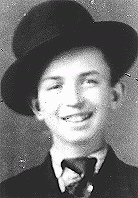You searched for: 5G基站源码系统快速搭建【TG���������@EK7676】平台包网搭建5G基站源码系统快速搭建【TG���������@EK7676】平台包网搭建13mqZeuPGv
<< Previous | Displaying results 301-325 of 426 for "5G基站源码系统快速搭建【TG���������@EK7676】平台包网搭建5G基站源码系统快速搭建【TG���������@EK7676】平台包网搭建13mqZeuPGv" | Next >>
-
Samson Reichstein
ID CardSamson was raised by Jewish parents in Tarnopol. His father died when Samson was 13, and Samson went to work to help support his mother and four brothers and sisters. In October 1918 Samson married Kaethe Ert, and the couple moved to Hanover, Germany, where Samson worked as a traveling salesman. Their son Herbert was born in 1920. 1933-39: In 1938 Samson and Kaethe got their son an exit visa on America's Polish quota (since they were Polish citizens). Later that year, the Gestapo came to their door with…
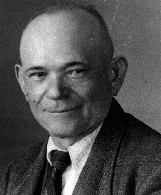
-
Eva Rapaport
ID CardEva was the only child born to nonreligious Jewish parents. Her father was a journalist. Eva enjoyed spending time with her cousin Susie, who was two years older. Eva also took special vacations with her mother. Sometimes they went skiing in the Austrian alps, and on other occasions they stayed at her uncle's cabin along the Danube River. 1933-39: When the Germans annexed Austria in 1938, life changed. Eva's father was harassed by the Gestapo for writing articles against the Germans. Her good friends…
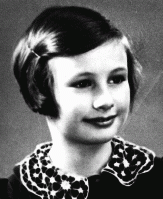
-
Nikola Mrvos
ID CardThe oldest of five children, Nikola was born in a small village in the Croatian part of Yugoslavia. Like his parents, Nikola was baptized in the Serbian Orthodox faith. After receiving his medical degree from Prague University, he married, and in 1912 moved with his wife to Serbia. During World War I he served in the Serbian army, and then settled in Novi Sad where he co-owned a medical clinic. 1933-39: Nikola and his wife raised three children in Novi Sad. Then difficult times brought on by the 1930s…
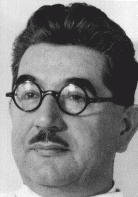
-
Helen Katz
ID CardThe youngest of eight children, Helen was born and raised in a religious Jewish family living in a town in northeastern Hungary. She was the "baby" of the family and the focus of everyone's hopes and affection. Although her Hebrew name was Hannah, her family called her by her nickname, Potyo, which meant "the dear little one." 1933-39: Helen liked school, but was afraid because some of the kids and teachers hated Jews. There was talk that there might be a war. Her mother wanted them to leave Hungary…
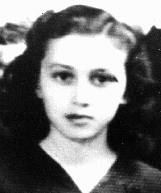
-
Martin Spett
ID CardKnown as Monek, Martin was the elder of two children raised by Jewish parents in the large town of Tarnow. His mother was an American citizen who had been raised in Poland. His father worked at the city's tax office. As a child, Martin liked to collect stamps and catch lizards. His parents wanted him to be a pharmacist, but he wanted to be an artist when he grew up. 1933-39: When the Germans occupied Tarnow in September 1939 after war began, Martin was 10 years old. The soldiers, in beautiful uniforms,…
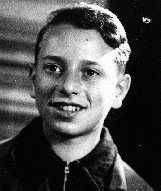
-
Ruth Freund Reiser
ID CardRuth was a child of middle-class Jewish parents living in Czechoslovakia's capital, Prague, where her father worked as a bank clerk. As native Czechs, her parents considered themselves as much Czech as Jewish. In 1933 Ruth was in her second year at a public girls' secondary school. 1933-39: The Germans occupied Prague in March 1939 and imposed many restrictions. Jews were no longer allowed to attend school, so Ruth's education stopped at age 13. Jews had to surrender many of their possessions such as…
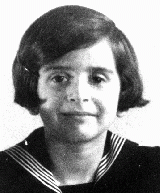
-
Gerda Blachmann
ID CardGerda was an only child of Jewish parents. They lived in Breslau, a large industrial city on the Oder River. Before World War II, Breslau's Jewish community was the third largest in Germany. Her father worked as a salesman for a large hardware and building materials company. Gerda attended public school until age 9 when she was admitted to a Catholic girls' school. 1933-39: Gerda walked through the city to see the aftermath of a pogrom. The windows of Jewish shops had been shattered. A torched synagogue…
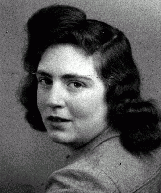
-
Jacob Wasserman
ID CardJacob was the eldest of three sons born to religious Jewish parents in the city of Krakow. His father was a flour merchant. The Wassermans spent summer vacations near Proszowice at a farm owned by their grandfather, who also ran a flour mill. 1933-39: In March 1939, at the age of 13, Jacob celebrated his bar-mitzvah. That summer, his family vacationed as usual at his grandfather's farm. They returned to a nightmare. Krakow had been occupied by the Germans on September 6. Jews were not allowed to walk on…
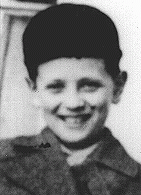
-
Pinchas Gerszonowicz
ID CardPinchas was born into a large family living in the town of Miechow in south central Poland. His father was a machinist and locksmith. Pinchas spent long days studying, either learning Hebrew in the Jewish school or taking general subjects at the public school. He belonged to the Zionist youth organization, Ha Shomer ha-Tsa'ir, and played left wing for a Jewish soccer team. 1933-39: At 13 Pinchas finished school and started work as an apprentice machinist and blacksmith in a building contractor's shop.…
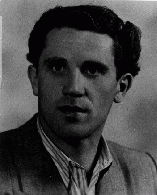
-
Irene Freund
ID CardThe younger of two children, Irene was born to Jewish parents in the industrial city of Mannheim. Her father, a wounded German army veteran of World War I, was an interior decorator. Her mother was a housewife. When the Nazis came to power in 1933, Irene's older brother, Berthold, was attending public school. Three-year-old Irene was at home with her mother. 1933-39: Celebrating Jewish holidays with all of Irene's aunts and uncles was really nice. One of her favorite places was the zoo; she especially…
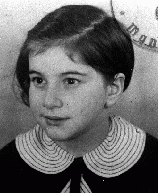
-
Chuna Grynbaum
ID CardChuna was born in a small one-story house that served as both his family's residence and their tailor shop. He was the youngest of nine children born to religious Jewish parents. The family's tailor shop mostly served Starachowice's Catholic Poles. The work was often done in exchange for goods such as firewood or a sack of potatoes. 1933-39: Chuna's father died unexpectedly in June 1939. After returning from synagogue one day, his father lay down to rest. He asked Chuna to close the shade to darken the…
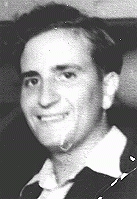
-
Zalie Waldhorn
ID CardZalie was the second of three children born to immigrant Jewish parents. Her Polish-born father was a former officer in the Austro-Hungarian army who had met and married her Hungarian-born mother during World War I. Shortly before Zalie was born, her parents settled in Paris. There, Zalie and her brother and sister grew up in a religious household. 1933-39: Zalie's mother said it was better in Paris than in the poor village in which she grew up. Her mother spoke broken French, but Zalie grew up speaking…
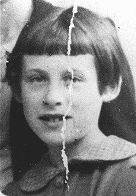
-
Frida Adler
ID CardFrida was the eldest of three daughters born to Jewish parents in a village in the easternmost province of Czechoslovakia. When Frida was 2, her parents moved to Liege, Belgium, a largely Catholic industrial city with many immigrants from eastern Europe. Frida attended Belgian public schools and grew up speaking French. 1933-39: In Liege Frida's family lived in an apartment above a cafe and across the street from a Catholic church. Frida had many Catholic girlfriends at school. At home she spoke Yiddish…
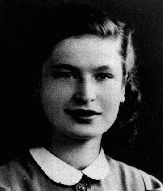
-
Judith Margareth Konijn
ID CardJudith was the younger of two children born to religious, middle-class Jewish parents. Judith's mother, Clara, was Sephardic, a descendant of Jews who had been expelled from Spain in 1492. Her father, Lodewijk, was a traveling representative for a firm based in Amsterdam. The family lived in an apartment in a new section of Amsterdam on the southern outskirts. 1933-39: Judith attended grade school with her cousin Hetty who was the same age. Judith loved to study. Her mother taught piano to students who…
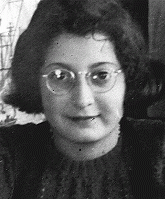
-
Coenraad Rood
ID CardCoenraad was born to a Jewish family in Amsterdam that traced its roots in the Netherlands back to the 17th century. After graduating from public school, Coenraad went on to train as a pastry maker at a trade school. But after completing his training at the age of 13, he decided for health reasons to change professions, and he began to study tailoring. 1933-39: Coenraad finished apprenticing as a tailor in 1937 when he was 20. Then he spent a year working as a nurse in a Jewish home for the permanently…
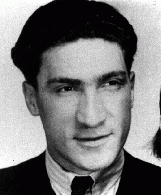
-
Ruth Singer
ID CardRuth was the only child of a Jewish family in the German town of Gleiwitz, near the Polish border. She attended public school until the fourth grade, when she transferred to a private Catholic school. Twice a week Ruth attended religious school in the afternoons. One of her favorite pastimes was playing table tennis. 1933-39: Ruth's father was born in Poland and the Nazi government considered him a Polish citizen. In October 1938 the Nazis expelled Polish Jews from Germany, allowing each deportee to leave…
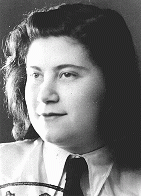
-
Hela Riemer
ID CardHela was raised in Dukla, a Polish village near the Czech border. In 1928 she married Elimelech Riemer and the couple settled in Berlin. Two years later, their only child, Edith, was born. The Riemers lived in an apartment building that housed offices of the Communist Party of Germany. 1933-39: Six years ago, in 1933, the Nazis accused Hela's family of breaking into the Communist Party's offices, so they escaped to a Polish town near the German border. A few days ago, just before the German invasion [of…
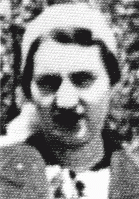
-
Natan Offen
ID CardNatan was one of four children born to religious Jewish parents. They lived in an apartment in Cracow's [Krakow] Podgorze district, a predominantly Jewish area on the southern bank of the Vistula River. Natan's father was a shoemaker until 1936, when he became a dealer in billiards equipment. His mother worked as a dressmaker. Natan and his siblings attended Polish public school. 1933-39: When Natan was 13 he built a crystal radio. Late at night, Natan and his father would listen to stations from all over…

-
Susanne Ledermann
ID CardSusanne was the younger of two daughters born to Jewish parents in the German capital of Berlin. Her father was a successful lawyer. Known affectionately as Sanne, Susanne liked to play with her sister on the veranda of her home and enjoyed visiting the Berlin Zoo and park with her family. 1933-39: After the Nazis came to power in January 1933, it became illegal for Jewish lawyers to have non-Jewish clients. When Susanne was 4, her father's law practice closed down and the Ledermanns moved to the…
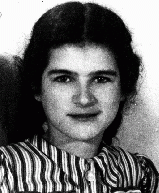
-
Onti Lazar
ID CardOnti, the youngest of five sons, was born to religious Jewish parents in northern Transylvania, a region of Romania that had belonged to Hungary until 1918. Onti's family usually called him Usher, which was the diminutive of his Yiddish name, Anschel. As a little boy, he liked collecting figurines. Though Onti grew up in a Hungarian-speaking home, he attended Romanian public schools. 1933-39: At age 13 Onti quit school to help make ends meet. He wanted to become a watchmaker, but he settled on working as…
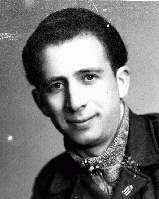
-
Josel Gerszonowicz
ID CardThe oldest of eight children, Josel was born in Miechow, a small town in south central Poland. His father was a machinist and locksmith. As a boy, Josel spent long days learning Hebrew in the Jewish school and taking general subjects at the public school. He was 13 years old when he left school to work in his father's shop. 1933-39: Josel met his wife, Esther, through a matchmaker, and they settled in nearby Dzialoszyce, a town with a Jewish community of about 7,000, and a beautiful synagogue that had…
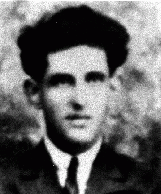
-
Morris Kornberg
ID CardMorris was the youngest of six children born to a religious Jewish family in Przedborz, a south central Polish town with a large Jewish population. Morris' family owned a business that supplied nearby factories with raw metal materials. 1933-39: When Germany invaded Poland in early September 1939 Morris and his family fled to the woods. They returned a few days later; most of the town had been burned down. The Nazis set up a ghetto and ordered everyone age 13 to 50 to report for work details. His family…
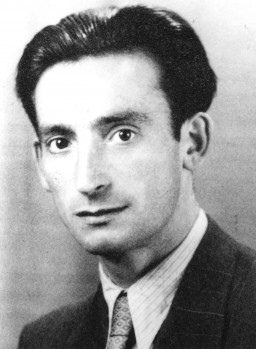
-
Johanna Falkenstein Heumann
ID CardThe oldest of five children, Johanna was born to Jewish parents living in a small town near Cologne. Her father owned a cigar factory. After Johanna graduated from high school, she worked in a bank in Cologne. At 22 she married Carl Heumann and the couple settled in the village of Hellenthal near the Belgian border. There they owned a general store. The couple had two daughters, Margot and Lore. 1933-39: A year ago Johanna's family moved to nearby Bielefeld, and she enrolled Margot and Lore in the city's…
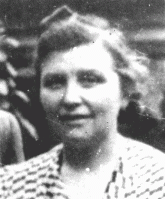
-
Moishe Felman
ID CardThe youngest of seven children, Moishe was raised in a Yiddish-speaking, religious Jewish home in Sokolow Podlaski, a manufacturing town in central Poland with a large Jewish population of some 5,000. Moishe's parents ran a grain business. Moishe attended a Jewish school and began public school in Sokolow Podlaski in 1933. 1933-39: Summer vacation had just finished and 13-year-old Moishe was about to begin another year at elementary school when the Germans invaded Poland on September 1, 1939. German…
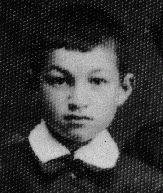
-
Jeno Brieger
ID CardJeno was born into a large, religious Jewish family in the village of Nagyhalasz in northeastern Hungary. The Briegers spoke Yiddish and Hungarian. After Jeno's mother died, his father remarried and the family moved to the town of Nyiregyhaza where his father owned and operated a hardware store. Nyiregyhaza had a Jewish population of 5,000. 1933-39: Jeno was the oldest son in a household of seven children. Nyiregyhaza was a rural town in which people still used horses and buggies. Jeno attended a…
